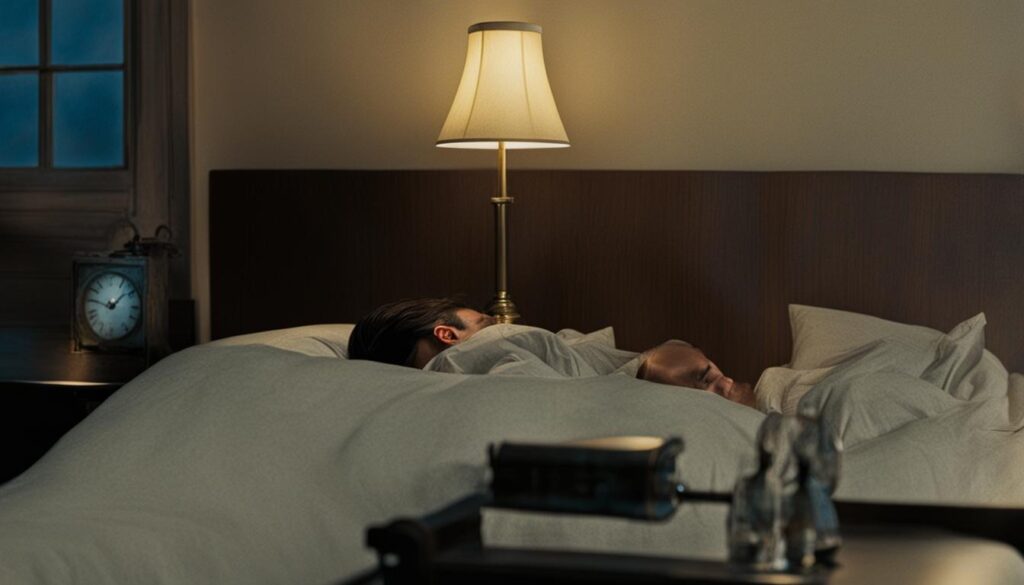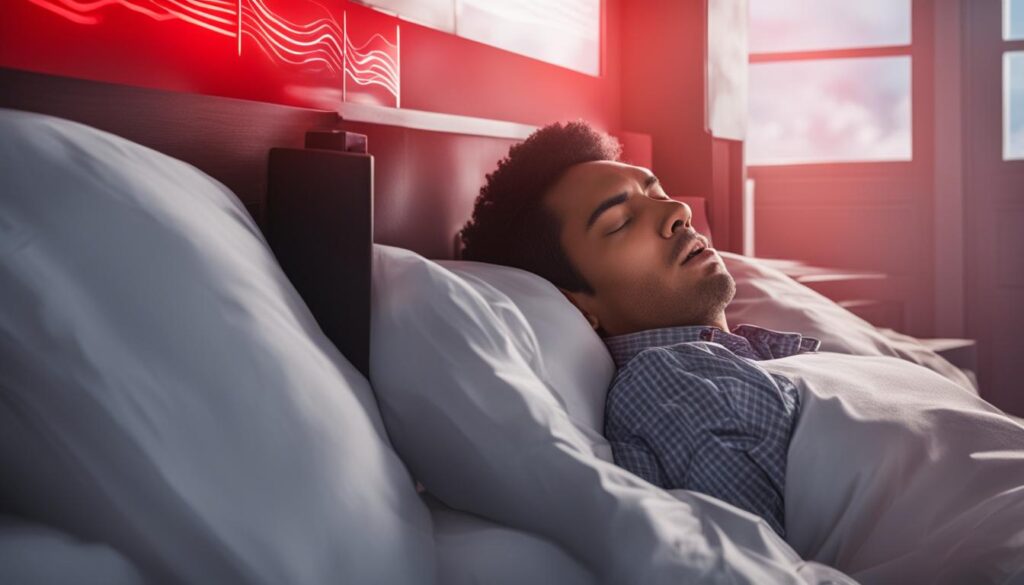Several common myths about sleep and productivity have been disproven by sleep science. It is crucial to distinguish between fact and fiction in order to understand the true effects of sleep on our daily performance and well-being.
Key Takeaways:
- Sleep deprivation has negative effects on decision-making, memory, focus, and creativity.
- Sleep quality and continuity are equally important as sleep duration.
- Getting out of bed when unable to sleep can help improve sleep patterns.
- Alcohol before bed disrupts sleep quality and should be avoided.
- A cooler bedroom temperature promotes better sleep quality.
Myth: Your body gets used to lack of sleep.
Contrary to popular belief, research has shown that the body does not adapt to a lack of sleep. Sleep deprivation has significant negative effects on both the short-term and long-term health of our bodies. It not only hinders decision-making, memory, focus, and creativity, but it also increases the risk of various health problems.
Sleep deprivation can lead to metabolic disorders, cardiovascular issues, a weakened immune system, and even mental health problems. It is clear that sleep is fundamental for our overall well-being and should never be taken lightly. Simply put, our bodies do not adjust or function optimally without adequate sleep.
Furthermore, it is essential to note that sleep duration is not the only factor to consider. While getting the recommended amount of sleep is important, the quality of sleep and uninterrupted sleep also play a crucial role in our health and productivity. Sleep continuity ensures that we experience the necessary restorative stages of sleep, which are vital for our physical and mental rejuvenation.
Sleep deprivation takes a toll on our bodies and minds, affecting various aspects of our functioning. To optimize our well-being, we must prioritize both the quantity and quality of our sleep.
To summarize, the idea that our bodies can adjust to a lack of sleep is nothing more than a myth. Sleep deprivation has numerous negative effects on our overall health, impacting not only our cognitive abilities but also our physical well-being. Prioritizing sleep duration, quality, and continuity is crucial for promoting optimal health and productivity.
| Short-term Effects | Long-term Effects |
|---|---|
| – Impaired decision-making | – Metabolic disorders |
| – Memory problems | – Cardiovascular issues |
| – Lack of focus | – Weakened immune system |
| – Decreased creativity | – Mental health problems |
Myth: How long you sleep is all that matters
When it comes to sleep, many people believe that the duration of their slumber is the sole determinant of its quality. However, this is a common misconception. While sleep duration certainly plays a role, it is not the only factor that matters for a restful and rejuvenating sleep experience. In fact, the significance of sleep quality and continuity should not be overlooked.
Sleep quality refers to the overall effectiveness of the sleep cycle and the depth of rest achieved during each stage. Even if you manage to sleep for a long period of time, if the quality of your sleep is poor, you may still wake up feeling tired and groggy.
Sleep continuity refers to the degree to which your sleep is uninterrupted throughout the night. Fragmented sleep with frequent awakenings can disrupt the natural flow of sleep stages, preventing you from reaching the deep, restorative phases of sleep that are crucial for physical and mental rejuvenation.
Research has shown that sleep interruptions and poor sleep continuity can have a significant impact on various aspects of our well-being. These include our cognitive function, emotional stability, immune system health, and even our ability to perform daily tasks efficiently.
To illustrate the importance of sleep quality and continuity, consider a scenario where you sleep for a solid eight hours but experience numerous awakenings throughout the night. Despite the seemingly adequate duration of sleep, the interruptions prevent you from achieving the deep, rejuvenating sleep your body needs. As a result, you may wake up feeling fatigued, lacking focus, and unable to perform at your best.
So, while it’s important to aim for an optimal amount of sleep each night, it is equally crucial to prioritize the actual quality and continuity of your sleep. This involves creating a sleep-friendly environment, establishing a consistent bedtime routine, and addressing any underlying sleep disturbances or conditions that may be interfering with your rest. By prioritizing both the quantity and quality of sleep, you can maximize the restorative benefits of a good night’s rest.
What the experts say:
“We now know that sleep quality and continuity are just as important as sleep duration when it comes to reaping the benefits of a good night’s rest. Even if you manage to sleep for the recommended number of hours, frequent interruptions can disrupt the restorative stages of sleep and leave you feeling tired and unfocused.” – Dr. Sleep Expert
The importance of sleep quality and continuity
| Benefits of Sleep Quality | Benefits of Sleep Continuity |
|---|---|
|
|
By recognizing the significance of sleep quality and continuity, you can prioritize the factors that truly contribute to a restful and rejuvenating sleep experience. Remember, a good night’s sleep is not just about how long you sleep, but also how effectively and seamlessly you traverse the stages of sleep.
Myth: If you are having trouble falling asleep, stay in bed until you can.
When it comes to trouble falling asleep, many of us believe that staying in bed and waiting for sleep to come is the best approach. However, this myth can actually worsen our sleep patterns and leave us feeling restless.
Instead, it’s important to break the association of bed with restlessness. When you find yourself unable to sleep, it’s better to get up and engage in a relaxing activity in a dimly lit setting. For example, you can try reading a book or practicing deep breathing exercises. By doing this, you create a positive association between your bed and sleep, allowing your mind and body to relax and prepare for restful sleep.
Benefits of Getting Out of Bed:
- Reduced restlessness: Getting out of bed helps to prevent restlessness from building up, allowing you to feel more relaxed when you return to bed.
- Positive sleep association: Engaging in a relaxing activity outside of bed helps to create a positive association between your bed and sleep.
- Improved sleep quality: Breaking the cycle of lying in bed when unable to sleep can help improve your sleep quality over time.
By implementing the practice of getting out of bed when you’re unable to sleep, you can break the cycle of restlessness and set the stage for a more restful night’s sleep. It’s important to remember that everyone’s sleep patterns are unique, so it may take some trial and error to find the best approach for you.
| Myth | Truth |
|---|---|
| If you are having trouble falling asleep, stay in bed until you can. | Get out of bed and engage in a relaxing activity until you feel drowsy. |
| Staying in bed perpetuates restlessness and can worsen sleep patterns. | Getting out of bed breaks the association of bed with restlessness and helps create a positive sleep connection. |
| Engaging in a relaxing activity outside of bed promotes relaxation and improves sleep quality. |
Myth: Alcohol before bed improves sleep.
Many people believe that having a drink or two before bed can help them sleep better. However, the truth is quite the opposite. While alcohol may initially induce drowsiness, it actually disrupts the quality of sleep, leading to negative effects on our overall restfulness and well-being.
When we consume alcohol, it interferes with our sleep cycles, causing more frequent awakenings throughout the night. This disrupts the natural progression of deep and REM sleep, which are essential for restoring our bodies and minds.
Not only does alcohol disrupt sleep cycles, but it can worsen existing sleep disorders, such as snoring and sleep apnea. It relaxes the muscles in the throat and can increase the intensity of snoring, leading to more interrupted sleep. For individuals with sleep apnea, alcohol can further obstruct the airways, exacerbating the condition.
To illustrate the negative effects of alcohol on sleep, here is a table highlighting the various ways it impacts our rest:
| Negative Effects of Alcohol on Sleep |
|---|
| Increased awakenings throughout the night |
| Worsened snoring and sleep apnea |
| Disruption of sleep cycles |
As the table shows, alcohol has a significant impact on the quality of our sleep. To improve the quality of your sleep, it’s important to reduce or eliminate alcohol consumption before bed. Instead, opt for a calming nighttime routine that promotes relaxation and healthy sleep habits.
“Alcohol disrupts the quality of sleep, leading to more frequent awakenings throughout the night.”
Remember, a good night’s sleep is crucial for our overall health and well-being. By avoiding alcohol before bed, you can ensure that you’re giving your body the best chance to achieve restful and rejuvenating sleep.

A Warm Bedroom Temperature: Myth or Reality?
When it comes to creating the perfect sleep environment, many believe that a warm bedroom temperature is the key to a restful night’s sleep. However, recent studies challenge this common misconception, revealing the benefits of a cooler sleeping environment. Contrary to popular belief, maintaining a temperature of around mid-60s Fahrenheit in the bedroom can actually promote better sleep quality and improve overall well-being.
It’s true that a warm and cozy bedroom can seem inviting, especially during colder months. But, our bodies naturally cool down during sleep, and a hot room can disrupt this cooling process, leading to unwanted awakenings and disturbed sleep patterns. Keeping the bedroom temperature in the cooler range encourages the body’s natural cooling mechanisms and promotes more restorative sleep.
In addition to preventing sleep disruptions, a cooler bedroom temperature offers other significant benefits. Research has shown that a cooler sleep environment can enhance the production of melatonin, the hormone responsible for regulating sleep-wake cycles, promoting faster sleep onset and a more synchronized sleep pattern overall.
Moreover, a cool sleep environment has been found to have a positive effect on reducing the risk of nightmares, night sweats, and respiratory problems associated with hot and stuffy rooms. It can also benefit individuals who suffer from certain sleep disorders, such as insomnia and sleep apnea.
So, what is the optimal bedroom temperature for sleep? The consensus among sleep experts is to maintain a temperature in the range of 60-67 degrees Fahrenheit (15-19 degrees Celsius) for an optimal sleep environment. However, personal preferences may vary. Experimenting with different temperature settings can help identify the ideal sleep temperature that works best for you.
The Drawbacks of a Warm Bedroom
While a warm bedroom may initially provide a sense of comfort, it’s important to consider the potential drawbacks. Here are a few reasons why a warm sleep environment may not be the best choice:
- Disrupted sleep continuity: High temperatures can result in increased wakefulness, leading to a fragmented sleep experience.
- Excessive sweating: A hot sleep environment can cause excessive sweating, making it uncomfortable and disrupting sleep.
- Increased risk of dehydration: Warm temperatures can contribute to dehydration during the night, which can negatively impact sleep quality.
- Difficulty regulating body temperature: A warm sleep environment can hinder the body’s natural ability to regulate its temperature, leading to discomfort and sleep disturbances.
- Worsening of existing sleep disorders: Individuals with sleep disorders such as insomnia or sleep apnea may experience exacerbated symptoms in a warm bedroom.
“Maintaining a cooler temperature promotes better sleep quality.”
By prioritizing a cooler bedroom temperature, you can create an optimal sleep environment that promotes better sleep quality and overall well-being. Embracing a cooler sleep environment can enhance your sleep experience and help you wake up feeling refreshed and rejuvenated.
Myth: Sleeping with a Light On is Harmless
Sleeping with a light on may seem harmless, but it can actually have negative effects on our sleep quality and overall well-being. Even when our eyes are closed, exposure to low levels of light during sleep can impact our circadian rhythm and increase the risk of awakenings.
Research suggests that sleeping with too much light in the bedroom can interfere with the production of melatonin, a hormone that promotes sleep. When melatonin levels are disrupted, it becomes harder to fall asleep and maintain a deep, restorative sleep.

Additionally, sleeping with a light on can lead to eye strain and potentially contribute to weight gain. Exposure to light during sleep hours can disrupt the body’s natural sleep-wake cycle, making it difficult to achieve optimal sleep and potentially affecting our metabolism.
To ensure higher-quality sleep and maintain a stable circadian rhythm, it is best to sleep in a dark room. Consider using blackout curtains, shades, or blinds to minimize external light sources. If complete darkness is not achievable, using an eye mask can also help block out unwanted light and promote better sleep.
Creating a sleep environment that prioritizes darkness can enhance your sleep quality and ensure you wake up feeling refreshed and well-rested.
Myth: You eat spiders in your sleep
The widely spread myth of eating spiders in sleep has no evidence to support it. Spiders are unlikely to willingly crawl into a person’s mouth, and the chances of swallowing one during sleep are extremely low. The myth may have originated from the desire to shock or fear of spiders, which affects a significant percentage of the population.
While many people find the thought of spiders crawling into their mouths while they sleep unsettling, it is important to remember that it is simply a myth with no scientific basis. Spiders tend to avoid humans and prefer their natural habitats. The chances of a spider willingly entering a person’s mouth are slim to none.
Additionally, the human body has natural reflexes and protective mechanisms that would make it highly unlikely for a spider to be swallowed while sleeping. The idea that people unknowingly consume spiders in their sleep is simply unfounded and lacks any concrete evidence.
It is worth noting that the myth of eating spiders in sleep has been perpetuated over the years, resulting in widespread belief. However, it is important to rely on scientific evidence and critical thinking when evaluating such claims.
So, rest assured that you can sleep soundly without the fear of accidentally ingesting any eight-legged creatures.
Myth: Women and men have equal risk of insomnia.
Contrary to popular belief, gender differences play a significant role in the occurrence of insomnia. Research has consistently shown that women are more likely to experience sleep disturbances and difficulties compared to men. Various factors contribute to this disparity, exposing women to a higher risk of insomnia. Let’s explore some of the key reasons behind this gender difference.
- Hormone fluctuations: Women experience hormonal changes throughout their reproductive years, particularly during menstruation, pregnancy, and menopause. These fluctuations can disrupt the natural sleep-wake cycle and contribute to sleep difficulties.
- Mood disorders: Conditions such as depression and anxiety are more prevalent in women and are known to negatively impact sleep. These disorders can lead to insomnia and make it challenging to maintain healthy sleep patterns.
- Excessive stress levels: Women often face unique stressors in their personal and professional lives, which can significantly affect sleep. Chronic stress can lead to increased difficulties falling asleep, staying asleep, and obtaining quality rest.
- Sleep disorders: Certain sleep disorders like sleep apnea and restless legs syndrome may be more common in women and can contribute to sleep disruptions and insomnia.
Pregnancy, a transformative period in a woman’s life, is often accompanied by sleep disturbances. Approximately half of pregnant individuals report experiencing poor sleep regularly. Hormonal changes, physical discomfort, frequent urination, and the anticipation of motherhood can all contribute to sleep difficulties during this time.
It is important to note that women may also be at a higher risk of underdiagnosis for sleep-disrupting conditions, such as sleep apnea. Symptoms of sleep apnea in women may differ from those commonly observed in men, leading to potential misdiagnosis or underrecognition of the condition.
In conclusion, gender differences significantly impact the risk of insomnia, with women being more susceptible to sleep disturbances. Understanding these factors can help healthcare professionals and individuals develop targeted interventions and strategies for better sleep health and overall well-being.
| Factors contributing to gender differences in insomnia | Impact on sleep |
|---|---|
| Hormone fluctuations | Disrupt the natural sleep-wake cycle |
| Mood disorders | Lead to difficulties falling asleep and maintaining healthy sleep patterns |
| Excessive stress levels | Result in increased sleep difficulties |
| Sleep disorders | Contribute to sleep disruptions and insomnia |
| Pregnancy | Commonly accompanied by sleep disturbances |

Myth: Napping makes up for a lack of nighttime sleep.
While a quick nap can provide an energy boost during the day, it cannot fully compensate for inadequate nighttime sleep. Napping might seem like a tempting solution to combat sleep deprivation, but it comes with its drawbacks. Relying solely on naps to make up for a lack of nighttime sleep can lead to a host of problems.
Napping can disrupt the sleep schedule, making it harder to fall asleep at a normal time. Our bodies have a natural rhythm, known as the circadian rhythm, that regulates our sleep-wake cycle. Taking long or late naps may interfere with this rhythm, causing difficulty in getting a restful night’s sleep when it’s time to hit the bed.
Long naps can also leave a person feeling disoriented and sluggish upon waking up. This phenomenon, known as sleep inertia, occurs when we awaken from a deep sleep, leading to grogginess and reduced cognitive performance. This can have a negative impact on productivity and overall daily functioning.
So, what’s the optimal duration for a nap? Research suggests that keeping naps shorter than 30 minutes is ideal. This allows you to reap the benefits of a quick boost in alertness and post-nap performance without diving into deeper stages of sleep that can cause sleep inertia.
Additionally, timing is crucial when incorporating napping into your routine. To avoid interfering with your nighttime sleep, it is best to take naps early in the afternoon. This ensures that you have enough time for the sleep pressure to build up before bedtime, promoting a more restful and consolidated night of sleep.
Napping can be a valuable tool in combating daytime fatigue, but it should not replace a proper nighttime sleep routine. By keeping naps short and timing them appropriately, you can enjoy the benefits of a quick recharge without compromising your overall sleep quality and schedule.
It is important to note that individuals with specific sleep disorders or medical conditions may have different guidelines or recommendations regarding napping. Consulting with a healthcare professional can provide personalized advice tailored to your specific needs.
| Drawbacks of Relying on Naps | Optimal Nap Duration |
|---|---|
|
Shorter than 30 minutes |
Takeaway: While napping can provide a temporary energy boost, it cannot replace a full night of quality sleep. Keeping naps short and timed appropriately can help prevent negative effects on nighttime sleep and maximize the benefits of a quick snooze.
Myth: Snoring is harmless and nothing can be done to reduce it.
While light snoring may not be a problem, loud and frequent snoring can be a symptom of sleep apnea. Sleep apnea is associated with obesity and can lead to cardiovascular strain due to decreased oxygen levels. Snorers, especially those with pauses in breathing, should seek medical evaluation for potential sleep apnea. Addressing snoring can improve sleep quality and overall health.

| Snoring and Health Risks | Relationship between Snoring and Sleep Apnea | Importance of Seeking Treatment for Snoring |
|---|---|---|
| Snoring, especially loud and frequent snoring, can be a sign of potential health risks. | Snoring can indicate sleep apnea, a sleep disorder associated with obesity and cardiovascular strain. | Seeking medical evaluation for snoring can address underlying sleep apnea and improve overall health. |
| Snoring can disrupt sleep quality and lead to daytime fatigue. | Sleep apnea involves pauses in breathing during sleep, resulting in decreased oxygen levels. | Untreated snoring and sleep apnea can negatively impact cardiovascular health. |
| Snorers, particularly those with pauses in breathing, should consult healthcare professionals. | Proper diagnosis and treatment of sleep apnea can improve sleep quality and overall well-being. | Addressing snoring can reduce sleep-related health risks and enhance overall quality of life. |
Myth: Your body gets used to lack of sleep
Excessive daytime sleepiness is a common concern for many individuals. It can impact our productivity, ability to concentrate, and overall quality of life. Contrary to popular belief, the notion that our bodies can adapt to a lack of sleep is nothing more than a myth.
While it is true that our bodies can temporarily adjust to a sleep deficit, the long-term consequences of sleep deprivation cannot be ignored. Even after getting sufficient sleep at night, some people may experience persistent daytime sleepiness, also known as excessive daytime fatigue. If left untreated, excessive daytime fatigue can have serious implications for both our mental and physical well-being.
There are various medical conditions that can cause daytime sleepiness, such as narcolepsy and sleep apnea. Narcolepsy is a neurological disorder characterized by sudden and uncontrollable episodes of sleep during the day, while sleep apnea is a condition in which breathing repeatedly stops and starts during sleep, leading to frequent awakenings and poor sleep quality. Both conditions can result in excessive daytime fatigue and should be properly diagnosed and treated under the guidance of healthcare professionals.
Risks associated with excessive daytime fatigue extend beyond impaired productivity and performance. Drowsy driving, for example, poses a significant threat to road safety. Studies have shown that driving while drowsy can impair our reaction times, decision-making abilities, and alertness, increasing the risk of accidents and injury. It is estimated that drowsy driving contributes to thousands of crashes each year, resulting in injuries and fatalities.
Medical Conditions Causing Daytime Sleepiness:
| Medical Conditions | Characteristics |
|---|---|
| Narcolepsy | Sudden and uncontrollable sleep episodes during the day |
| Sleep apnea | Repeated breathing interruptions during sleep, leading to poor sleep quality |
If you find yourself experiencing excessive daytime fatigue or suspect an underlying medical condition, it is important to seek medical advice and undergo appropriate evaluation. A healthcare professional can help diagnose the cause of your daytime sleepiness and recommend suitable treatment options to improve your sleep quality and enhance your overall well-being.
Addressing excessive daytime sleepiness is crucial for our health, safety, and productivity. By debunking the myth that our bodies can adapt to a lack of sleep, we can raise awareness about the importance of addressing underlying medical conditions causing excessive daytime fatigue. Don’t ignore the signs of excessive sleepiness, and prioritize your sleep health for a better and more vibrant life.
Myth: You can make up for the zzz’s you skipped the night before with some extra shut eye later on.
Many of us believe that we can compensate for a lack of sleep by getting some extra snooze time later. However, this is just a myth. Accumulating sleep debt by consistently not getting enough sleep can have serious consequences for our overall well-being, performance, and safety.
Sleep deprivation not only leaves us feeling groggy and fatigued, but it can also have long-term health effects. Studies have linked insufficient sleep to a range of health problems, including high blood pressure, obesity, depression, and cognitive impairments. These health consequences emphasize the importance of prioritizing regular sleep patterns and ensuring that we get the recommended seven to nine hours of sleep each night.
Aiming for regular and sufficient sleep is crucial for maintaining optimal physical and mental health. By understanding the risks associated with sleep deprivation and taking steps to establish healthy sleep habits, we can prioritize our well-being and ensure that we are giving our bodies the rest they need to function at their best.

| Consequence | Description |
|---|---|
| High blood pressure | Prolonged sleep deprivation has been linked to an increased risk of hypertension. |
| Obesity | Lack of sleep can disrupt hormone regulation, leading to weight gain and an increased risk of obesity. |
| Depression | Sleep deprivation is associated with higher rates of depression and can worsen existing mental health conditions. |
| Cognitive issues | Poor sleep affects our cognitive function, impairing memory, focus, attention, and decision-making abilities. |
Myth: Snoring is common and not harmful.
Snoring is often considered a common and harmless occurrence during sleep. However, it is essential to understand that excessive snoring, especially in men, can be a symptom of a more serious condition called sleep apnea.
Sleep apnea is a sleep disorder characterized by frequent pauses in breathing during sleep. These pauses can be brief but can cause a significant strain on the cardiovascular system and lead to various health risks.
One of the main cardiovascular risks associated with sleep apnea is decreased blood oxygen levels. When breathing pauses, oxygen levels in the blood drop, putting stress on the heart and other organs in the body. Over time, this strain can increase the likelihood of developing cardiovascular diseases such as hypertension, heart attack, and stroke.
It is important not to ignore loud and persistent snoring, as it may indicate an underlying sleep apnea condition. Seeking medical evaluation for potential sleep apnea is crucial to identify and address the issue before it leads to further complications.
Preventing Cardiovascular Risks
To reduce the cardiovascular risks associated with sleep apnea, individuals who snore loudly should consider the following approaches:
-
Consult a healthcare professional: A medical evaluation can help determine if sleep apnea is causing the snoring and guide appropriate treatment options.
-
Weight management: Obesity is a major risk factor for sleep apnea. Losing weight through a balanced diet and regular exercise may help alleviate symptoms.
-
Continuous Positive Airway Pressure (CPAP) therapy: CPAP machines deliver a constant stream of air to the airways, preventing them from collapsing during sleep and reducing snoring and apnea episodes.
-
Oral appliances: Dentists can provide custom-made oral devices that help keep the airways open during sleep, reducing snoring and improving breathing.
-
Lifestyle modifications: Avoiding alcohol and sedatives, sleeping on the side instead of the back, and maintaining a consistent sleep schedule are all recommended lifestyle changes to support better sleep and minimize snoring.
By addressing snoring and sleep apnea, individuals can improve their sleep quality, reduce cardiovascular risks, and enhance their overall health and well-being.
Myth: Teens Don’t Require More Sleep than Adults, and Drowsy Teens in Class are Lazy
Contrary to popular belief, teenagers have different sleep needs compared to adults. While adults generally require 7-9 hours of sleep per night, teenagers need more sleep to support their growing bodies and developing brains. The National Sleep Foundation recommends that teens get around 8.5-9.5 hours of sleep every night for optimal health and well-being. Unfortunately, many teens struggle to meet these sleep requirements due to a variety of factors.
One significant factor that often disrupts teenagers’ sleep is their late sleep-wake patterns. The hormonal changes during adolescence cause a shift in circadian rhythms, making it challenging for teens to fall asleep early and wake up early. This becomes especially problematic when combined with early school start times, forcing teens to wake up earlier than their natural biological clock allows. As a result, many teens experience drowsiness and fatigue during the day, which can have a significant impact on their ability to concentrate and learn effectively.
Drowsiness in class is not indicative of laziness on the part of teenagers. Insufficient sleep can lead to difficulties with attention, memory, decision-making, and problem-solving. When teens are unable to get the sleep they need, their academic performance and overall well-being may suffer. It is essential for parents, educators, and policymakers to understand the sleep needs of teenagers and take steps to support their healthy sleep habits.
Setting consistent sleep schedules is crucial for teenagers to get the sleep they require. Encouraging them to establish a regular bedtime and wake-up time can help regulate their sleep-wake cycles and promote better-quality sleep. It is also essential to create an environment conducive to sleep, with a comfortable and quiet bedroom free from distractions like electronic devices.
By prioritizing teenagers’ sleep needs and educating them about the importance of quality sleep, we can help them thrive academically, emotionally, and physically.
In conclusion, debunking the myth that teens don’t require more sleep than adults is crucial for promoting their overall well-being. Insufficient sleep can have a detrimental impact on teenagers’ cognitive and physical health. By setting consistent sleep schedules and fostering a sleep-friendly environment, we can support teens in getting the sleep they need for optimal growth and development.
Conclusion
When it comes to sleep and productivity, it is important to separate fact from fiction. By debunking common myths, we can gain a better understanding of how sleep truly impacts our daily performance and overall well-being. It is not true that our bodies can adapt to lack of sleep; in fact, sleep deprivation has both short-term and long-term negative effects on our decision-making, memory, focus, and creativity. Sleep quality and continuity are equally important as sleep duration, as fragmented sleep with frequent awakenings can interfere with the restorative stages of sleep.
Contrary to popular belief, staying in bed when struggling to fall asleep can have a negative impact on sleep patterns. It is better to get up and engage in a relaxing activity until drowsiness sets in to avoid associating the bed with restlessness. Additionally, while alcohol may induce drowsiness, it disrupts the quality of sleep, leading to more awakenings and interference with sleep cycles. It is crucial to reduce or eliminate alcohol consumption before bed.
A warm bedroom temperature may feel cozy, but studies show that a cooler bedroom temperature, around mid-60s Fahrenheit, is more conducive to sleep. Sleeping with a light on, even when our eyes are closed, can increase the risk of awakenings and disrupt our circadian rhythm. It is best to sleep in a dark room or use an eye mask for better sleep quality.
In conclusion, prioritizing both sleep duration and quality can greatly improve productivity and overall health. If you have persistent sleep concerns or disorders, it is important to consult healthcare professionals for proper guidance and treatment. By dispelling myths and embracing evidence-based knowledge, we can optimize our sleep habits and enhance our well-being.
FAQ
Does your body adapt to lack of sleep?
No, sleep deprivation has both short-term and long-term negative effects on the body, including hindering decision-making, memory, focus, and creativity. It can also lead to various health problems, such as metabolic disorders, cardiovascular issues, weakened immune system, and mental health issues.
Is sleep duration the only factor that matters?
No, sleep quality and continuity also play a crucial role in maximizing the benefits of sleep. Fragmented sleep with frequent awakenings can interfere with the restorative stages of sleep. It is important to prioritize both the quantity and quality of sleep for optimal well-being.
Should you stay in bed if you’re struggling to fall asleep?
No, staying in bed when you’re struggling to fall asleep can have a negative impact on your sleep patterns. It is better to get up and engage in a relaxing activity in a dim setting, such as reading a book, until you feel drowsy. This helps to associate your bed with sleep and avoid feelings of restlessness.
Does alcohol before bed improve sleep?
No, while a drink or two may induce drowsiness, alcohol actually disrupts the quality of sleep. It can lead to more frequent awakenings, worsen snoring and sleep apnea, and interfere with sleep cycles. Reducing or eliminating alcohol consumption before bed is crucial for improving the quality of sleep.
Is a warm bedroom temperature best for sleeping?
No, although a warm bedroom may feel cozy, studies show that a cooler bedroom temperature, around mid-60s Fahrenheit, is more conducive to sleep. The body naturally cools down during sleep, and a hot room can disrupt this process and cause unwanted awakenings. Maintaining a cooler temperature promotes better sleep quality.
Is it harmless to sleep with a light on?
No, even when your eyes are closed, exposure to low levels of light during sleep can increase the risk of awakenings and interfere with circadian rhythm. Sleeping with too much light in the bedroom can also lead to eye strain and potentially weight gain. It is best to sleep in a dark room or consider using an eye mask to promote higher-quality sleep and a stable circadian rhythm.
Do we eat spiders in our sleep?
No, the widely spread myth of eating spiders in sleep has no evidence to support it. Spiders are unlikely to willingly crawl into a person’s mouth, and the chances of swallowing one during sleep are extremely low. The myth may have originated from the desire to shock or fear of spiders, which affects a significant percentage of the population.
Do women and men have equal risk of insomnia?
No, research shows that women are more likely to experience poor sleep and sleep disruptions compared to men. Hormone fluctuations, mood disorders, excessive stress levels, and sleep disorders contribute to women’s increased risk. Pregnancy also often leads to sleep problems, with approximately half of pregnant individuals reporting poor sleep regularly. Women may be at higher risk of underdiagnosis for sleep-disrupting conditions like sleep apnea.
Can napping make up for lack of nighttime sleep?
No, while a quick nap can provide an energy boost during the day, it cannot fully compensate for inadequate nighttime sleep. Napping can disrupt the sleep schedule further, making it harder to fall asleep at a normal time. Long naps can leave a person disoriented and sluggish. It is best to keep naps shorter than 30 minutes and take them early in the afternoon if needed.
Is snoring harmless and unavoidable?
No, while light snoring may not be a problem, loud and frequent snoring can be a symptom of sleep apnea. Sleep apnea is associated with obesity and can lead to cardiovascular strain due to decreased oxygen levels. Snorers, especially those with pauses in breathing, should seek medical evaluation for potential sleep apnea. Addressing snoring can improve sleep quality and overall health.
Should excessive daytime sleepiness be ignored?
No, excessive daytime sleepiness can occur even after getting enough sleep at night and may be indicative of underlying medical conditions like narcolepsy or sleep apnea. Daytime sleepiness should not be taken lightly, as it increases the risk of accidents and injury, especially when driving. It is important to address the underlying medical condition causing daytime sleepiness.
Can we make up for missed sleep later on?
No, accumulating a sleep debt by consistently not getting enough sleep can have long-term negative effects on performance, safety, and overall health. Missing out on sleep is linked to a variety of health problems, including high blood pressure, obesity, depression, and cognitive issues. It is important to prioritize regular sleep patterns and aim for the recommended seven to nine hours of sleep each night.
Is snoring common and harmless?
No, snoring, especially in men, can be a symptom of sleep apnea. Sleep apnea is associated with obesity and can lead to frequent awakenings and decreased blood oxygen levels. This places a strain on the cardiovascular system and increases health risks. Individuals who snore loudly should seek medical evaluation for potential sleep apnea.
Do teenagers require the same amount of sleep as adults?
No, unlike adults, teenagers require more sleep, around 8.5 to 9.5 hours per night. Late sleep-wake patterns in teens, combined with early school start times, can lead to drowsiness in class. This can negatively impact their learning and shouldn’t be attributed to laziness. Encouraging consistent sleep schedules and earlier bedtimes can help teens get the sleep they need.
Can sleep myths impact productivity and well-being?
Yes, it is crucial to separate fact from fiction when it comes to sleep and productivity. Debunking common myths allows for a better understanding of how sleep truly impacts our daily performance and overall well-being. Prioritizing both sleep duration and quality can lead to improved productivity and better overall health. It is important to consult healthcare professionals for any persistent sleep concerns or disorders.










